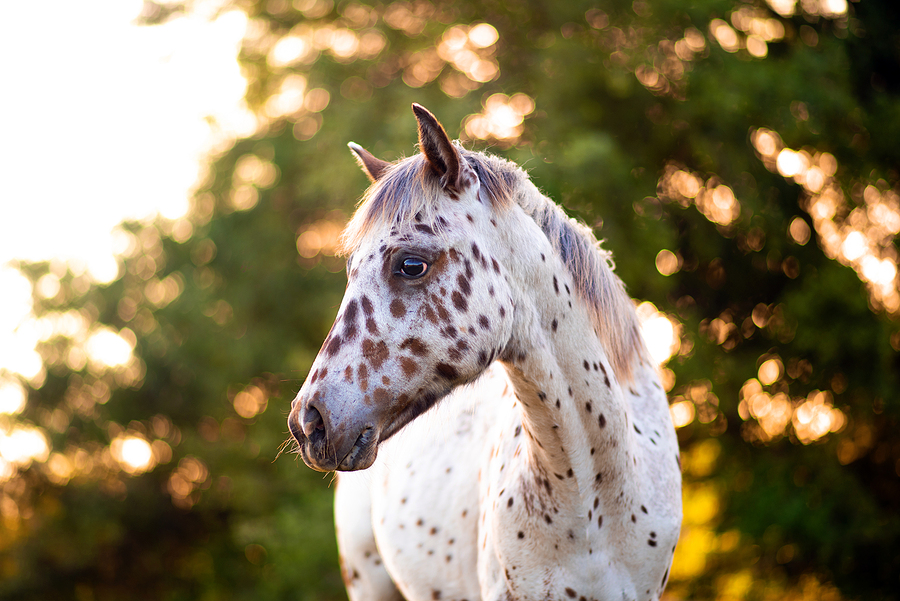Can you tell if your horse is afraid or stressed? As prey animals, horses work hard to hide their emotions and the signs could be very subtle. A horse’s reaction to a scary thing might seem like a sudden explosion because you missed the clues about what he was thinking leading up to that moment. We can’t tell our horses what they should fear. It could be something as simple as running a set of clippers near them. Or it could be that scary trash can that wasn’t at the end of the driveway yesterday, or a bumpy trailer ride.
Your horse experiences physical reactions to fear and stress. Here are some examples:
- His muscles tense and he might freeze in place, the first step in the “flight or fight” response.
- He lifts his head and points his ears towards the sound or thing that is bothering him.
- His nostrils flare and he may snort, snap his tail, or stomp his foot.
- His pupils dilate and he doesn’t blink.
- His sympathetic nervous system, which activates the fight or flight response, causes his heart rate and respiration (breathing) to speed up. This diverts blood away from his digestive system to his brain, lungs, and muscles so he has energy to run away or fight.
Stacie Boswell, DVM, DACVS-LA, and an Elite Fear Free Certified Professional (Veterinary), advises that recognition of these physical responses is critical. Horses don’t process information as quickly as humans, and they will react first and think about it later, an important survival skill in the wild.
She recommends slowing down or stopping what you are doing to give your horse an extra minute or two to process what he’s seeing. Your calm reaction helps him recognize that he’s safe and helps develop trust between you. Horses are herd animals, and they will follow the herd leader: you or another horse. Forcing him to continue may result in a violent reaction.
A horse who experiences ongoing (chronic) stress will suffer long-term physical consequences. This can occur as a result of separation from his horse buddies, moving to a new barn, trauma, or intense training and competition. A horse who lives alone will suffer without herdmates to give him a sense of security. Hunger can cause stress that leads to digestive issues. Horses are grazing animals, and their stomachs are meant to be processing food constantly. Because there is less blood flow to the digestive system during stressful periods, this can cause widespread inflammation. The immune system can be seriously compromised, causing gastric ulcers, colic, and diarrhea, which require veterinary care.
A chronically stressed horse may be more reactive to occasionally stressful incidents. You might see behaviors such as cribbing, calling, or repetitive pacing. His body concentrates on coping rather than supporting regular body functions. Respiratory disease, skin problems, and premature aging can also sometimes be traced to the effects of long-term stress on the horse.
How do you recognize when your horse is starting to relax? You will see specific behaviors that indicate he is releasing some of the stress in his body. These are called self-soothing behaviors:
- Lowering his head, exhaling deeply, shaking the body from head to tail
- Licking and chewing
- Yawning, which cools the brain. A horse’s brain functions better at a cooler temperature.
- Blinking.
- Rubbing his head on his lower leg.
The Fear Free Happy Homes website has an excellent handout summarizing how to recognize fear, anxiety, and stress in horses. There are also several other articles on specific topics such as reducing fear of loud noises, and stress-free grooming.
Don’t dismiss the chance that your horse might be ill or injured. Evaluate the outside forces that are affecting him and work with a Fear Free Certified veterinarian or professional to assess his wellbeing and figure out your next steps.
This article was reviewed/edited by board-certified veterinary behaviorist Dr. Kenneth Martin and/or veterinary technician specialist in behavior Debbie Martin, LVT.
Terry Albert is an award-winning writer and pet portrait artist in Bear Valley Springs, California. She has been active in rescuing homeless dogs for more than 20 years and has served on the board of directors for several nonprofit organizations.
Want to stay in the loop on the latest and greatest in keeping your pet happy and healthy? Sign up for our free newsletter by clicking here!








